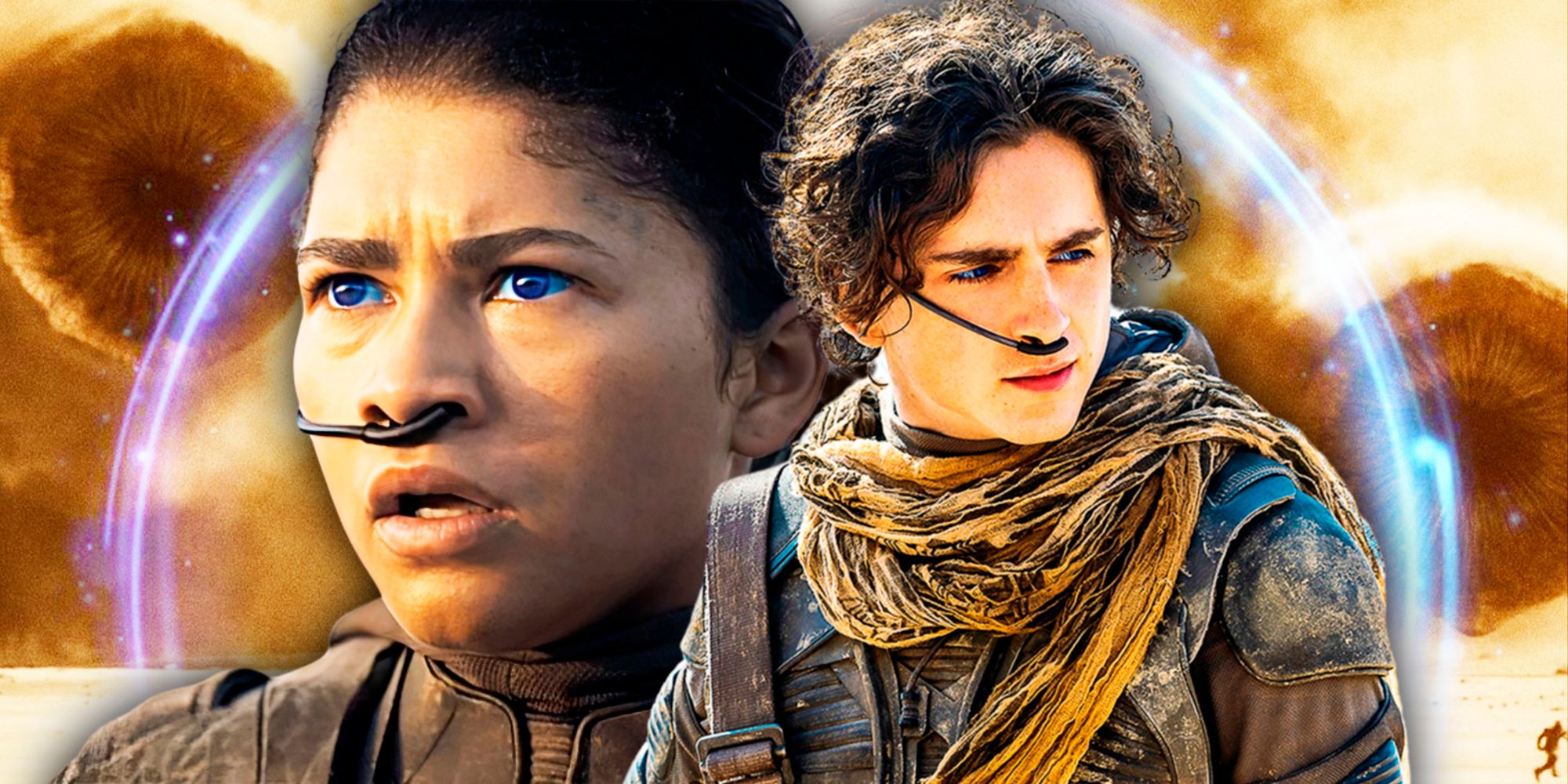Denis Villeneuve’s upcoming film, Dune 3, set for late 2026, will adapt Frank Herbert’s sequel, Dune: Messiah. This installment is expected to conclude Paul Atreides’ character arc, honoring his ambiguous ending in the novel, without killing him off. While fans may desire adaptations of all six Dune books, going beyond Dune 3 could diminish Villeneuve’s established legacy and limit his ability to pursue other projects. Adapting the subsequent Children of Dune would undermine Paul’s narrative, making his eventual fate feel anticlimactic. Villeneuve aims to create a self-contained trilogy, akin to Christopher Nolan’s Dark Knight series, elevating modern sci-fi cinema.
Warning: Major SPOILERS for Frank Herbert’s Dune Messiah.The upcoming film in Denis Villeneuve’s cinematic Dune series, tentatively titled Dune 3, is set to be released in late 2026. This third installment, inspired by Frank Herbert’s sequel novel Dune: Messiah, is anticipated to mark the filmmaker’s final foray into this universe. While Herbert penned six Dune novels, including one that continues the story of Timothée Chalamet’s Paul Atreides, it would be unwise for Villeneuve to pursue further adaptations of Herbert’s works.
Additional Dune films would divert Villeneuve’s attention from other creative projects and could jeopardize the legacy he has established for this franchise. Certainly, there will be countless fans clamoring for a complete cinematic representation of Frank Herbert’s Dune series in order of publication. However, it’s important to understand that Paul Atreides serves as a compelling protagonist primarily in the original Dune novel and its sequel Dune: Messiah. Following Herbert’s third novel, Children of Dune would diminish the integrity of the characters that Villeneuve and Chalamet have developed.
Dune 3 Will Provide A Fitting Ending For Paul Atreides’ Character Arc
Dune: Messiah’s Ambiguous Ending Epitomizes Paul As A Hero
Embodying the qualities of an enigmatic and messianic hero in science fiction, Paul Atreides’ journey concludes in a notable ambiguous fashion in Frank Herbert’s Dune: Messiah. After becoming blind and losing his prophetic abilities, Paul follows a Fremen tradition, wandering into the desert. This act signifies Atreides’ profound connection to Dune, a reference to Arrakis and its distinctive landscape. Furthermore, by adhering to Fremen customs, he ensures loyalty to the Atreides lineage for generations to come.
We can expect Villeneuve to conclude Paul Atreides’ character arc in a manner akin to Herbert’s treatment in Dune: Messiah.
If Denis Villeneuve chooses to end Dune 3 in this manner, Paul Atreides will not meet a tragic fate. Instead, Timothée Chalamet’s character will fade into the vast wilderness of Arrakis, invincible yet profoundly human. This will serve as the ideal conclusion for a Dune trilogy focused on Atreides, preserving the air of mystery that enveloped him from the outset.
While Dune 3 will undoubtedly diverge from Herbert’s Dune: Messiah in certain elements, Villeneuve should maintain fidelity to the core narrative—as he did in his previous adaptations of Herbert’s Dune. Consequently, we can anticipate a resolution to Paul Atreides’ arc that honors his legacy with an appropriately open-ended exit from the cinematic realm.
Villeneuve Adapting Dune: Messiah’s Sequel Children Of Dune Would Ruin Paul’s Story
What Happens To Paul Atreides In Children Of Dune Undercuts Everything Before It
Conversely, should Villeneuve deviate from his initial plan for a trilogy of Dune films and extend the narrative into Frank Herbert’s Children of Dune, it would irreversibly tarnish Paul Atreides’ conclusion. In Children of Dune, Paul re-emerges from the desert masquerading as a cryptic preacher, only to be graphically slain by his sister Alia’s forces, against her wishes.
The demise of the central character of both Dune and Dune: Messiah under such arbitrary and seemingly unnecessary circumstances devalues the entire narrative journey of Paul Atreides. His death serves not only as an anticlimactic end but also cheapens his earlier heroic efforts and the profound journey into the desert.
Related
Dune Already Proved The Best Way To Follow Villeneuve’s Movies 21 Years Ago
The Dune franchise has already proven that Denis Villeneuve’s proposed Dune: Part Three isn’t the best way to end Paul Atreides’s epic story.
It’s evident that Herbert draws a parallel between Paul Atreides and Jesus Christ, who, according to the Gospel, returns from the desert to challenge the established religious order, ultimately facing execution by Roman authorities. However, continuing Paul Atreides’ narrative in this manner does not translate well cinematically and would clash with the foundations laid by the first two movies.
Too Many Dune Movies Would Spoil The Franchise And Prevent Villeneuve From Doing Other Projects
It’s Already 8 Years Since Villeneuve Made A Movie That Wasn’t Dune
Setting aside the implications of a Denis Villeneuve adaptation of Children of Dune on Paul Atreides, producing more than three Dune films adapted from the novels would effectively undermine the director’s franchise. Anticipation already looms over how Villeneuve will successfully navigate the bleaker and more complex narrative of Dune: Messiah, given that Herbert’s sequel presents a challenging tone. If the second novel poses this degree of difficulty, then the potential complications for Villeneuve adapting Children of Dune, not to mention Herbert’s last three Dune novels, would be significant.

Related
The Secret Obsession That Makes Dune (And Villeneuve’s Other Movies) So Good
Dennis Villeneuve’s obsession with Frank Herbert’s Dune was no secret, but another fixation shaped all his protagonists over the last decade.
Regardless of the success of his Dune films, Denis Villeneuve possesses far too much potential as one of the preeminent filmmakers of his generation to remain confined to a single franchise. He is currently working on an ambitious nuclear apocalypse film that promises to deliver a completely unprecedented viewing experience. However, it would be unfeasible for him to pursue this or any other project while remaining focused on the Dune series. It’s already been eight years since Villeneuve released a film that wasn’t part of the Dune franchise, specifically, the 2017 film Blade Runner 2049. That absence may extend to a full decade by the time he completes Dune 3.
Villeneuve Ending His Dune Saga With Messiah Could Make A Perfect Trilogy Like Christopher Nolan’s Dark Knight Movies
The Director’s First Two Dune Movies Are Worthy Of Their Status As Modern-Day Sci-Fi Masterpieces
If Denis Villeneuve adheres to his initial vision for a self-contained series of Dune films, Dune 3 could conclude the trilogy on a high note. Villeneuve’s three-part Dune narrative would endure like Christopher Nolan’s Dark Knight Trilogy, casting a lengthy shadow over other films of its time while elevating the standards for sci-fi cinema. The conclusion of Dune: Messiah even mirrors elements from Nolan’s Batman trilogy, as Paul Atreides’ fate is left open-ended, akin to Bruce Wayne’s at the end of The Dark Knight Rises.
Denis Villeneuve himself has clarified that his three Dune films are not a trilogy, as the first two are a diptych adapted from a single book. Nonetheless, the audience is likely to perceive them as a trilogy since they contribute to a collective overarching narrative.
Moreover, the Dune franchise will not lack content, with HBO’s well-received series Dune: Prophecy likely the first in a lineup of several spinoff series based on Frank Herbert’s other works, as well as the prequel Dune novels crafted by Brian Herbert and Kevin J. Anderson. For many casual Dune enthusiasts, Denis Villeneuve’s cinematic masterpieces will represent the definitive beginning and conclusion. Villeneuve should stay committed to his original principle of prioritizing quality over quantity, ensuring that Dune 3 serves as the ultimate farewell to Paul Atreides.
